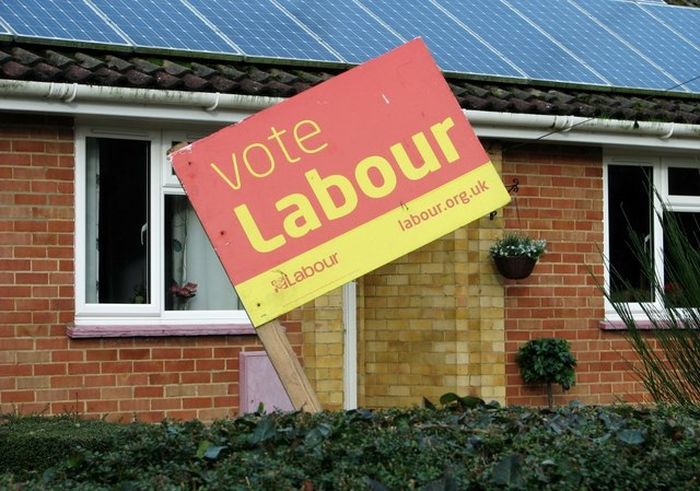Labour’s ‘attack ads’: Clever campaigning or cheap name-calling?
Joseph Duffy and Daniel Hilton face off on whether Labour’s new adverts are smart and strategic, or tacky and debasing

Joseph:
Winning elections is never all sunshine and roses. When Ed Miliband’s failure of an attack ad flipped into a positive Conservative campaign, Labour went off with their tail between their legs, vowing to focus on “issues not personalities”. The Tory campaign, however, did nothing of the sort, running a huge campaign portraying Miliband “in the pocket” of the SNP. Labour failed to realise the hard truth: these clever, underhand tactics really can make or break an election. An inquiry into Labour’s 2015 defeat found the result was greatly caused by these very attack ads.
It was the same story under Corbyn. The Conservatives spent over £1m on negative Facebook campaigns alone in 2017, then going even further in 2019, depicting Corbyn in a chicken suit in one advert and in another misrepresenting him as refusing to condemn IRA bombings. Nothing was too low for the Conservatives, whilst Labour repeatedly refused to embrace negative campaigning.
Starmer isn’t making the same mistake. Labour’s ads focus on issues which resonate strongly with the British public as a whole (i.e. crime, taxes, the environment), not just pandering to pre-secured Labour voters. Whilst Tories clutch their pearls and Observer polls find both Labour and the Conservatives lost popularity overall from the ads, the real goal is overlooked. By capturing undecided voters who straddle the centre-line, Labour strengthen their lead whilst in the chaos, the Lib Dems and other parties weaken the Tory vote further, potentially ousting them from not just government, but the opposition benches too.
Claims that Labour are somehow opening the door to response attacks is ridiculous; that door has been off its hinges for decades. For example, whilst Labour’s campaign began in April, the Conservatives had already run adverts in March accusing Starmer of “backing people smugglers over the British people”, just because he wouldn’t support the Rwanda plan. While Labour’s ads may embellish facts, they don’t exactly lie. Sunak could impose minimum sentences on sex offenders (as exist for some crimes) but hasn’t. Conversely, the Rwanda plan has no clear provisions to prevent trafficking, making this accusation a complete fabrication, not just exaggeration. Regardless, only one of these campaigns received huge backlash - Labour’s. This comes as no surprise, as according to a 2019 analysis, the Conservatives enjoyed “more positive than negative coverage” from the media, while Labour “had a substantial deficit of positive to negative news reports”.
“You might not like it, but attack ads are an important part of modern politics”
Some argue creating an “us versus them” rhetoric in politics can be dangerous, placing blame on individuals rather than ideologies. Whilst it could certainly be true that painting Starmer as siding with people smugglers could increase the danger to him, someone does not attack nor kill a politician solely because of an advert. This comes from a much larger culture created through social media, extremist groups, the press, and much more. Negative campaigning is a small subsection of this.
Whilst some of the Left might hope campaigns can be won on the moral high ground, this is a fantasy Labour cannot afford to indulge. You might not like it, but attack ads are an important part of modern politics, and critical to public opinion of Britain’s major parties. Negative campaigning has long been the Achilles’ heel of the Labour party, but no longer. Labour has finally found its backbone, and it’s about time they worked out negative campaigning.
Daniel:
Labour’s attack ads cheapen politics to the lowest of the low, even cheaper than the almost-wine you get with the last of your student loan. And in some ways they’re very similar – both are sour, both aggravate your taste buds (political or literal), and both will probably leave lasting damage on your (or Westminster’s) physiology.
But despite their similarities, at least the cheap wine still ultimately serves its purpose after you finish the bottle, while Labour’s ads do the exact opposite of what they’re supposed to – motivating people to vote against the parties making baseless accusations. By losing the moral high ground, Labour ceases to be a beacon of hope against populism for those fed up with the Tories’ culture-war-stoking nonsense. Instead, it becomes yet another party devoid of its former principles.
“To defeat the Tories, Labour needs to uphold their moral high ground”
At first, it may seem like an intelligent move from Labour Comms to start producing these attack ads. I mean, they’re simply substituting their ivory towers and high horses for knuckle-dusters and barbed wire to fight the Tories on their own terms… right? If Boris calls Starmer a nonce for not prosecuting Saville, surely it’s justified for Starmer to slate Sunak for not prosecuting 4,500 child abusers? How foolish this is.
To defeat the Tories, Labour needs to uphold their moral high ground, not throw it away in favour of a superficial game of one-upmanship between party leaders. Their gargantuan point-leads only came after a series of Conservative sleaze scandals and policy blunders, with the electorate increasingly sick of a government that’s more of a rogue’s gallery than the “strong and stable” leadership they promised under Theresa May. It’s because of this that they turn to Starmer’s trusty (although rather dull and charmless) hands. Holding the moral high ground was the perfect strategy to combat a Conservative administration that had haplessly dropped the ball, and Labour has lost any chance of gaining a decisive lead by cheapening politics to simple name-calling.
It’s not that the child abuse attack ad is an outlier, since the others aren’t much better. Each advert covering everything from council tax rises to gun crime (and even the raw sewage scandal) lays the blame squarely at the feet of Sunak. It’s only in the small print that they pin blame on the party as a whole. Even removing my own personal distaste for these adverts, the singular focus on Sunak sidesteps the major problem: the Tory party is rotten to the core.
You’re not even directly voting for Starmer or Sunak in a local or general election anyway, you’re voting for local councillors and MPs, who are often fairly removed from the party leaders anyway. Banging on about the PM rather than the party leads to a failure to recognise the widespread systemic failures of the Conservatives that we’ve all had front row seats at over the past 13 years. At the end of the day, the ads are forgetting one of the most powerful weapons Labour has in their arsenal – a Tory track record of tacky administration.
 News / Colleges charge different rents for the same Castle Street accommodation2 March 2026
News / Colleges charge different rents for the same Castle Street accommodation2 March 2026 News / News in Brief: waterworks, wine woes, and workplace wins 1 March 2026
News / News in Brief: waterworks, wine woes, and workplace wins 1 March 2026 News / Climate activists protest for ‘ethical careers policy’1 March 2026
News / Climate activists protest for ‘ethical careers policy’1 March 2026 News / Angela Merkel among Cambridge honorary degree nominees27 February 2026
News / Angela Merkel among Cambridge honorary degree nominees27 February 2026 News / Private school teacher who lied about Cambridge degree barred from teaching27 February 2026
News / Private school teacher who lied about Cambridge degree barred from teaching27 February 2026










